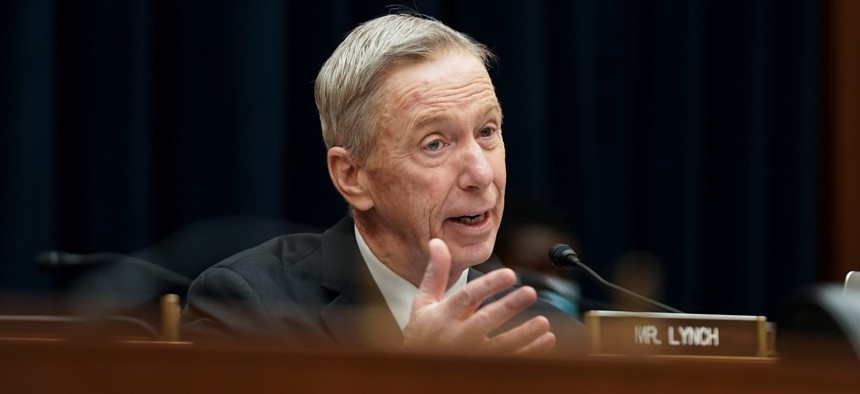
Rep. Stephen Lynch, D-Mass., would like the State Dept. to recover funds. Pool / Getty Images
The State Dept. Should Recover Taxpayer Dollars ‘Wasted’ on a U.S. Embassy, Lawmaker Says
The construction of a new embassy compound in Ashgabat, Turkmenistan has been delayed for years.
A lawmaker wants the State Department to recover millions of taxpayer funds that a contractor “wasted” during the construction of a U.S. embassy.
In September 2014, the State Department awarded Caddell Construction Co. LLC a $196 million contract for the design and construction of a new embassy compound in Ashgabat, Turkmenistan, but it has been delayed due to issues with permits. Rep. Steven Lynch, D-Mass., chairman of the House Oversight and Reform Committee’s National Security panel, sent a letter to Secretary of State Antony Blinken on Tuesday––shared exclusively with Government Executive ahead of its public release–– calling on the State Department to recover “wasted” taxpayer funds in the process.
“The subcommittee has obtained correspondence indicating that in February 2021, the department notified Caddell that the company is liable, or at least partially liable, for failing to obtain the necessary building permits prior to construction of the embassy chancery, which interrupted and ultimately delayed the project, and has resulted in an estimated $95 million to $125 million in additional costs,” said the letter. “Although the department ‘discussed a path forward on assignment of liability and a model of shared responsibility,’ with Caddell in March 2022 as part of an ongoing contract modification process, the department has not confirmed whether Caddell has agreed to reimburse American taxpayers for any of these funds.”
According to the letter, Caddell didn’t obtain the necessary building permits as required by the Turkmenistan government, before construction began in November 2015. As a result, the location of the chancery, which is the principal office for a foreign mission (called the “new office building”), violated a local regulation. In July 2016, the Turkmenistan government demanded Caddell stop construction, which was after about $26 million in U.S. taxpayer dollars was already spent. The State Department determined that Caddell is liable, or at the minimum partially liable, for not obtaining the necessary permits, which Caddell disputed.
In addition to the $26 million, the department now estimates the total cost for the embassy compound will be at least $430 million, which is over $200 million more than specified in the 2014 contract. Also, as a result of the delay, operations at the embassy have been affected negatively, Lynch added.
“During a call with subcommittee staff in January 2022, the department reported that despite its previously stated intent to recover these funds during ongoing construction and cost negotiations with Caddell, a contract modification had been issued to Caddell to rebuild the [new office building] without reaching a resolution about Caddell’s financial liability,” wrote Lynch. He asked for an answer by Friday on whether State will hold Caddell financially liable.
Government Executive reached out to Caddell for comment on the letter, but the company did not immediately respond for comment. The company has worked on various U.S. embassies and consulates around the world and has contracted with other federal agencies.
In October 2020, Caddell argued that “the government, not Caddell, was responsible for directing the location of the [new office building] through its clearly stated design intent and for obtaining the appropriate permits,” according to a letter cited in Lynch’s correspondence.
However, the State Department still did not agree as the contracting officer wrote that in a January 2020 report the department’s inspector general “premised Caddell’s liability for these additional costs primarily on Caddell’s failure to obtain required construction permits from the Turkmen government prior to initiating construction and its failure to verify that necessary permits had been obtained.”
The IG’s review on the delay in construction and violation of city law––that spanned from June to November 2019––said this error happened partially because State’s Bureau of Overseas Buildings Operations personnel “failed to follow internal procedures that guide the planning of construction projects,” said the report. “In addition, the construction contractor, Caddell, failed to obtain required construction permits from the Turkmen government prior to initiating construction.” The report also noted that the IG office previously identified in 2008 and 2015 reports issues with facilities at the Ashgabat’s embassy.
When asked about the watchdog’s findings on the Bureau of Overseas Buildings Operations a committee spokesperson on background told Government Executive the subcommittee “already engaged” the department staff about the IG’s findings and reiterated that the department determined that it was “Caddell’s failure to obtain the necessary construction permits [that] was the ‘proximate cause’ of the Government of Turkmenistan’s stop-work order.”
When asked for comment, a State Department spokesperson said on background that, "as a general matter, we do not comment on congressional correspondence."
The office of Rep. Glenn Grothman, R-Wis., ranking member on the subcommittee, declined to comment.
This article has been updated with comment from the State Department.







